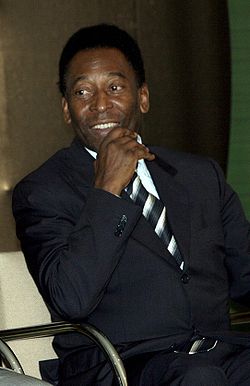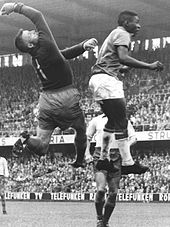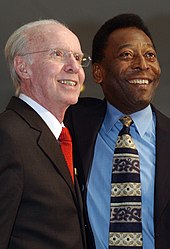In my opinion he was the best because of his unmatched skill and accomplishments on the soccer field. Not only that, but he has always been a true sportsman, never used drugs, has always been a gentleman, a kind, respectful, generous and humble human being. I have never forgotten that day he and his national team of Brazil beat Italy, I believe it was the 1970 World Cup Tournament. That day he scored gains Italy, and even thogh I was a teenager I cried for the disappointment of seing my country defeated. Then many years after that I saw him play in the USA. It was his last game many years ago, his last soccer game, for the NY Cosmos at the Meadowlands stadium in New jersey. After the game he said this: "Love is the greatest thing in the world." And then, while the public gave him a standing ovation, he walked around the field and "gave five", touched the kids' hands. This is a tribute to a great athlete and a man. You can read about him below, and you can watch his life story told in the film: Pele. Birth of Legend. I saw it, and it was magnificent! An emotional, fun, and action packed movie that you and your family and friends will enjoy!
Has any other soccer player ever scored over 1,200 goals? No! Has any other soccer player won the World Soccer Tournament more than him, 3 times? No! Pele is the only one who has reached those 2 goals!

To see his skills and goals visit YouTube and type: Pele's greatest goals
Or copy and paste this link for his best 10 goals
https://www.youtube.com/watch?v=4jNia16doUE
| Pelé | |||||||||||||||||||||||||||||||||||||||||||||||||
|---|---|---|---|---|---|---|---|---|---|---|---|---|---|---|---|---|---|---|---|---|---|---|---|---|---|---|---|---|---|---|---|---|---|---|---|---|---|---|---|---|---|---|---|---|---|---|---|---|---|

Pelé in 2008
|
|||||||||||||||||||||||||||||||||||||||||||||||||
| Born | Edson Arantes do Nascimento 23 October 1940 Três Corações, Minas Gerais, Brazil |
||||||||||||||||||||||||||||||||||||||||||||||||
| Occupation | |||||||||||||||||||||||||||||||||||||||||||||||||
| Height | 1.73 m (5 ft 8 in) | ||||||||||||||||||||||||||||||||||||||||||||||||
| Spouse(s) |
|
||||||||||||||||||||||||||||||||||||||||||||||||
| Partner(s) | Xuxa (1981–86) | ||||||||||||||||||||||||||||||||||||||||||||||||
| Children | |||||||||||||||||||||||||||||||||||||||||||||||||
| Parent(s) | Dondinho, Celeste Arantes | ||||||||||||||||||||||||||||||||||||||||||||||||
| Website | www |
||||||||||||||||||||||||||||||||||||||||||||||||
Association football career
|
|||||||||||||||||||||||||||||||||||||||||||||||||
Pelé began playing for Santos at age 15 and the Brazil national football team at 16. During his international career, he won three FIFA World Cups: 1958, 1962 and 1970, being the only player ever to do so. Pelé is the all-time leading goalscorer for Brazil with 77 goals in 92 games. At club level he is also the record goalscorer for Santos, and led them to the 1962 and 1963 Copa Libertadores. Pelé's "electrifying play and penchant for spectacular goals" made him a star around the world, and his club team Santos toured internationally in order to take full advantage of his popularity. Since retiring in 1977, Pelé has been a worldwide ambassador for football and has made many acting and commercial ventures. In 2010, he was named the Honorary President of the New York Cosmos.
Pelé has also been known for connecting the phrase "The Beautiful Game" with football. A prolific goalscorer, Pelé was known for anticipating his opponents' movements in the field, and being able to shoot strong and accurate shots with both feet. Early in his career, he played in a variety of attacking formations. In his later career, he played in a playmaking role behind offensive strikers. In Brazil, he is hailed as a national hero for his accomplishments in football and for his outspoken support of policies that improve the social conditions of the poor. Throughout his career and in his retirement, Pelé received several individual and team awards for his performance in the field, his record-breaking achievements, and legacy in the sport.
South American Championship
Pelé also played in the South American Championship. In the 1959 competition he was named best player of the tournament and was top scorer with 8 goals, as Brazil came second despite being unbeaten in the tournament.[45][49][50]1962 World Cup
Pelé fighting for a ball against the Swedish goalkeeper Kalle Svensson during the 1958 World Cup final
1966 World Cup
Pelé was the most famous footballer in the world during the 1966 World Cup in England, and Brazil fielded some world champions like Garrincha, Gilmar and Djalma Santos with the addition of other stars like Jairzinho, Tostão and Gérson, leading to high expectations for them.[55] Brazil was eliminated in the first round, playing only three matches.[55] The World Cup was marked, among other things, for foulings on Pelé that left him injured by the Bulgarian and Portuguese defenders.[56]Pelé scored the first goal from a free kick against Bulgaria, becoming the first player to score in three successive FIFA World Cups, but due to his injury, a result of persistent fouling by the Bulgarians, he missed the second game against Hungary.[55] Brazil lost that game and Pelé, although still recovering, was brought back for the last crucial match against Portugal at Goodison Park in Liverpool by the Brazilian coach Vicente Feola. Feola changed the entire defense, including the goalkeeper, while in midfield he returned to the formation of the first match. During the game, Portugal defender João Morais fouled Pelé, but was not sent off by referee George McCabe.[57] Pelé had to stay on the field limping for the rest of the game, since substitutes were not allowed at that time.[57] After this game he vowed he would never again play in the World Cup, a decision he would later change.[51]
1970 World Cup
Pelé was called to the national team in early 1969, he refused at first, but then accepted and played in six World Cup qualifying matches, scoring six goals.[58] The 1970 World Cup in Mexico was expected to be Pelé's last. Brazil's squad for the tournament featured major changes in relation to the 1966 squad. Players like Garrincha, Nilton Santos, Valdir Pereira, Djalma Santos and Gilmar had already retired. However, Brazil's 1970 World Cup squad, which included players like Pelé, Rivelino, Jairzinho, Gérson, Carlos Alberto Torres, Tostão and Clodoaldo, is often considered to be the greatest football team in history.[59][60]
Pelé, front row second from right, before the match against Peru in the 1970 World Cup
Mário Zagallo (Brazil's 1970 coach with Pelé in 2008).
Zagallo said of Pelé: "A kid in Sweden [1958 World Cup] gave signs of
genius, and in Mexico [1970 World Cup] he fulfilled all that promise and
closed the book with a golden key. And I had the privilege to see it
all from close up."[65]
Brazil played Italy in the final at the Azteca Stadium in Mexico City.[67] Pelé scored the opening goal with a header over Italian defender Tarcisio Burgnich. He then made assists on Brazil's third goal, scored by Jairzinho, and the fourth finished by Carlos Alberto. The last goal of the game is often considered the greatest team goal of all time because it involved all but two of the team's outfield players. The play culminated after Pelé made a blind pass that went into Carlos Alberto's running trajectory. He came running from behind and struck the ball to score.[68] Brazil won the match 4–1, keeping the Jules Rimet Trophy indefinitely, and Pelé received the Golden Ball as player of the tournament.[45][69] Burgnich, who marked Pelé during the final, was quoted saying "I told myself before the game, he's made of skin and bones just like everyone else — but I was wrong".[70]
Pelé's last international match was on 18 July 1971 against Yugoslavia in Rio de Janeiro. With Pelé on the field, the Brazilian team's record was 67 wins, 14 draws and 11 losses.[58] Brazil never lost a match while fielding both Pelé and Garrincha.[71]













No comments:
Post a Comment